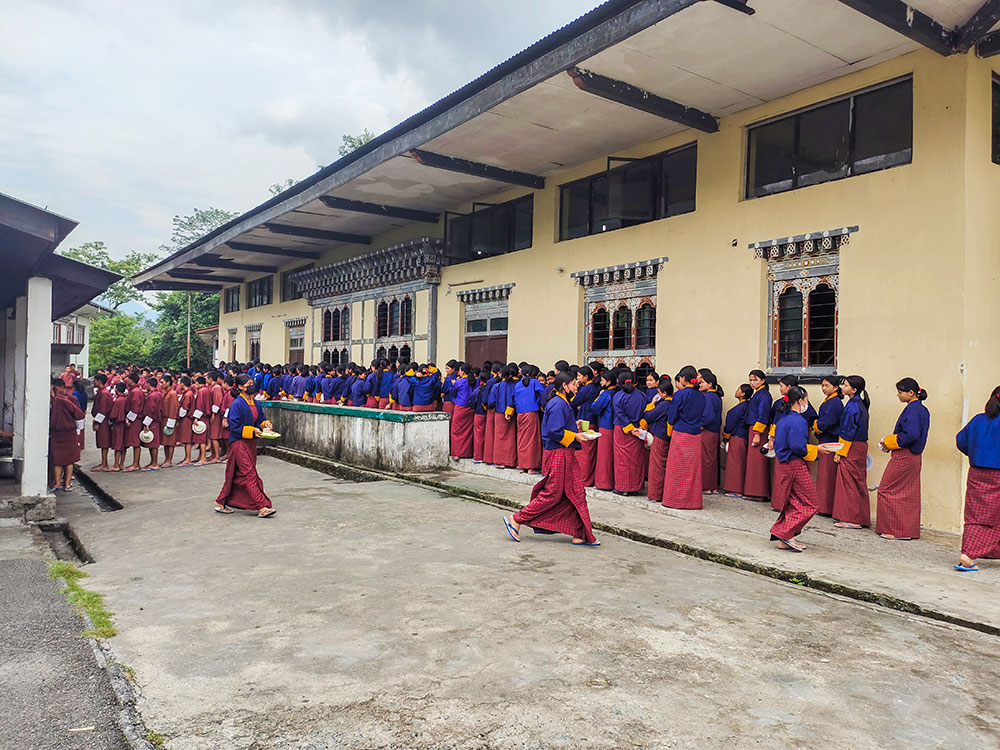Lhakpa Quendren | Panbang
In remote schools such as Sonamthang Central School in Zhemgang, the lack of access to menstrual hygiene products, particularly alternative period products, presents a significant challenge among other hardships. While sanitary pads are more readily available in local shops, the absence of easy access poses a hurdle for managing menstrual hygiene, especially for boarding schoolgirls.
Due to restrictions on visiting shops, many girls admitted to carrying pads in their bags for two to three days during their periods. During emergencies, some students face challenges in accessing menstrual health products. When girls find themselves without these necessary supplies, the school store provides pads, and others receive them from friends and teachers.
While most girls rely on disposable sanitary pads, some express a preference for alternative options such as reusable menstrual products and menstrual cups, especially when they are in school.
Ugyen, a 17-year-old twelfth grader, noted the long-term cost and environmental benefits of reusable pads. “Although reusable pads are not locally available, we get them from our friends. Some friends even make reusable pads,” she said.
Despite hearing about menstrual cups and the comfort they offer, Ugyen Choden admitted to never having seen one. She expressed interest in trying them, considering their sustainability and wide acceptance among women and girls.
However, Tshering, a 19-year-old twelfth grader, prefers reusable pads due to their affordability. She highlighted the challenges of using reusable pads in gloomy weather when sunlight for drying them is scarce.
For Tshering, attending classes during her menstrual cycle becomes even more challenging, as it hampers her ability to concentrate on her studies. She also expressed concerns about potential leakage during heavy bleeding.
In hot places like Sonamthang, she mentioned that menstruation causes rashes, but fortunately, the school has sufficient water supplies, making menstrual hygiene-maintenance less problematic.
Yeshey, a seventeen-year-old eleventh grader, opts for low-cost sanitary pads. Her three-day period can cost up to Nu 80 per month, depending on the duration and her needs. “I choose low-cost disposable sanitary pads,” she said.
Schoolgirls and teachers believe that menstrual cups would be the optimal choice for resource-poor settings. Although they require a higher initial investment than sanitary pads, menstrual cups prove to be more cost-effective in the long run.
Norbu Deki, a teacher, said that the school receives sanitary pad support from the WHO once every one or two years. However, with numerous schoolgirls in need, each girl only receives two pads, which is insufficient for a month. “While we are aware of other alternatives, reusable pads and menstrual cups are not currently available in our area,” she said. “Rather than providing sanitary pads, we believe it would be beneficial to provide menstrual cups, despite the higher cost.”
Norbu Deki also emphasised the financial burden of sanitary pads on students. “Many students opt for low-cost sanitary pads. We do not recommend reusable pads and clothes due to hygiene concerns.”
Pema Tshojay, another teacher, acknowledged that in the past, stained clothing caused embarrassment for girls and attracted teasing and laughter from boys. However, with increased awareness and advocacy programmes, such incidents have diminished.
Girls require supportive facilities and environment in schools that promote menstrual hygiene management to ensure regular attendance and active participation unless they face severe issues.
Rinzin Wangdi, principal of Sonamthang School, acknowledged that some girls take leave during their menstrual periods. “Students should ideally have 170 days of attendance in one academic session, but their menstrual leaves are not counted as absences,” he stated. “I understand the challenges faced by girls during menstruation at school, and it is crucial to support them during this time.”
Currently, there is no shop within the school compound, as the school canteen concluded its term a week ago.
As part of advocating Equity for Red Hygiene, Kuensel will publish a series of stories on Menstrual Health Management in partnership with MoESD and partners.



